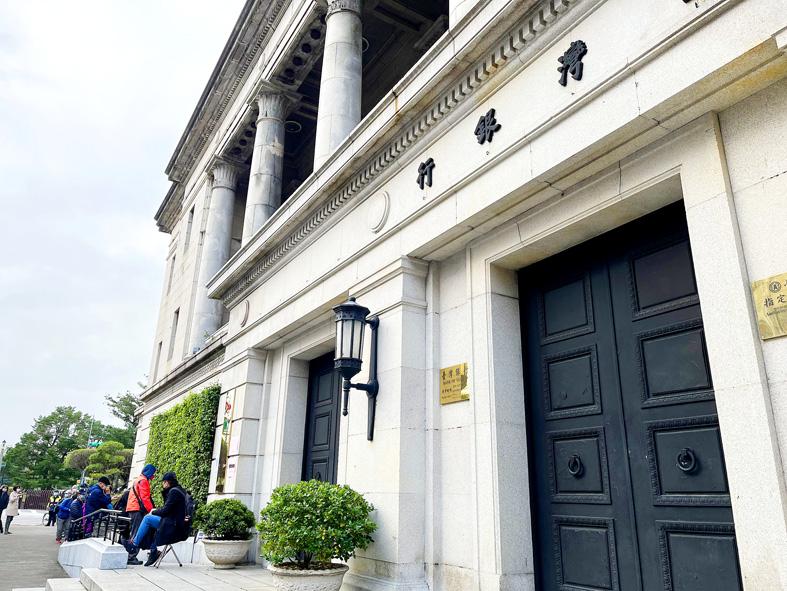State-run banks yesterday said that they would raise interest rates on savings deposits and loans after the central bank last week raised its policy rates by 25 basis points, but would approach the matter guided by business needs and other considerations.
Top officials from state-run lenders made known their intentions during a meeting of the legislature’s Finance Committee in Taipei, where lawmakers raised questions about the impact of the rate hikes.
State-owned Bank of Taiwan (臺灣銀行) has increased the interest rates on its savings deposits by 0.25 percentage points, but would not impose similar charges on all lending operations to retain customers, chairman Joseph Lyu (呂桔誠) said.

Photo: CNA
Starting yesterday, the nation’s largest lender by assets raised the interest rate on time savings deposits of different tenures by 25 basis points, benefits that failed to be extended to large deposits and demand deposit accounts.
Bank of Taiwan did not comment on how the rate hike would affect syndicated loans, land financing, corporate lending and mortgage operations.
Similarly, state-run Mega International Commercial Bank (兆豐銀行) is to raise interest rates on time savings deposits by 25 basis points, but the adjustment for demand deposits would be smaller, chairman Michael Chang (張兆順) said.
Taiwan Cooperative Bank (合庫銀行) chairman Lei Chung-dar (雷仲達) said that he would stand by the central bank’s policy in dealing with savings and loans except for demand deposits. Lenders generally offer very small interest rates for demand deposits.
State-run and private banks are to discuss lending rates this week and implement the changes next month.
Interest rates for mortgages are likely to rise from 1.31 percent to upward of 1.56 percent to reflect the central bank’s monetary normalization, adding an extra NT$1,200 (US$42.12) a month for homeowners with a NT$10 million mortgage.
Interest rates for land financing are likely to climb to at least 2.05 percent from 1.8 percent to help discourage land hoarding.
While ample liquidity and record-low borrowing costs aimed at mitigating the pain of the COVID-19 pandemic had helped drive up property prices, the increase in funding costs would reduce developers’ and builders’ financing needs, and the property market would reflect real demand by home buyers, Capital Investment Management Corp (群益投顧) said in a note yesterday, adding that demand would remain strong as the nation’s economic fundamentals continue to improve.
State-owned Land Bank of Taiwan (土地銀行) announced earlier that it would not take on new land financing after related lending approached the regulatory limit.
The Financial Supervisory Commission has tightened capital requirements for real-estate lending, obligating banks intent on growing their real-estate lending to demonstrate higher capitalization, but it remains to be seen if developers and builders would pass higher interest expenses to home buyers, analysts said.

With an approval rating of just two percent, Peruvian President Dina Boluarte might be the world’s most unpopular leader, according to pollsters. Protests greeted her rise to power 29 months ago, and have marked her entire term — joined by assorted scandals, investigations, controversies and a surge in gang violence. The 63-year-old is the target of a dozen probes, including for her alleged failure to declare gifts of luxury jewels and watches, a scandal inevitably dubbed “Rolexgate.” She is also under the microscope for a two-week undeclared absence for nose surgery — which she insists was medical, not cosmetic — and is

CAUTIOUS RECOVERY: While the manufacturing sector returned to growth amid the US-China trade truce, firms remain wary as uncertainty clouds the outlook, the CIER said The local manufacturing sector returned to expansion last month, as the official purchasing managers’ index (PMI) rose 2.1 points to 51.0, driven by a temporary easing in US-China trade tensions, the Chung-Hua Institution for Economic Research (CIER, 中華經濟研究院) said yesterday. The PMI gauges the health of the manufacturing industry, with readings above 50 indicating expansion and those below 50 signaling contraction. “Firms are not as pessimistic as they were in April, but they remain far from optimistic,” CIER president Lien Hsien-ming (連賢明) said at a news conference. The full impact of US tariff decisions is unlikely to become clear until later this month

GROWING CONCERN: Some senior Trump administration officials opposed the UAE expansion over fears that another TSMC project could jeopardize its US investment Taiwan Semiconductor Manufacturing Co (TSMC, 台積電) is evaluating building an advanced production facility in the United Arab Emirates (UAE) and has discussed the possibility with officials in US President Donald Trump’s administration, people familiar with the matter said, in a potentially major bet on the Middle East that would only come to fruition with Washington’s approval. The company has had multiple meetings in the past few months with US Special Envoy to the Middle East Steve Witkoff and officials from MGX, an influential investment vehicle overseen by the UAE president’s brother, the people said. The conversations are a continuation of talks that

CHIP DUTIES: TSMC said it voiced its concerns to Washington about tariffs, telling the US commerce department that it wants ‘fair treatment’ to protect its competitiveness Taiwan Semiconductor Manufacturing Co (TSMC, 台積電) yesterday reiterated robust business prospects for this year as strong artificial intelligence (AI) chip demand from Nvidia Corp and other customers would absorb the impacts of US tariffs. “The impact of tariffs would be indirect, as the custom tax is the importers’ responsibility, not the exporters,” TSMC chairman and chief executive officer C.C. Wei (魏哲家) said at the chipmaker’s annual shareholders’ meeting in Hsinchu City. TSMC’s business could be affected if people become reluctant to buy electronics due to inflated prices, Wei said. In addition, the chipmaker has voiced its concern to the US Department of Commerce